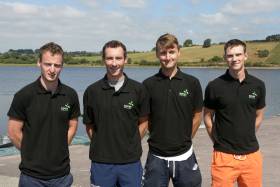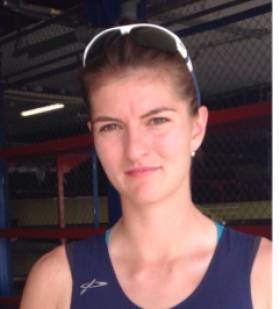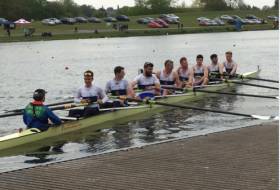Displaying items by tag: Taylor
#Rowing: Ireland’s lightweight quadruple scull of Miles Taylor, Niall Beggan, Ryan Ballantine and Andrew Goff won their repechage and moved into the A Final at the World Under-23 Championships in Poznan, Poland.
The Ireland crew would have gone through with first or second and they disputed the lead with Spain until half way. But Ireland hit that line first and went on to lead. Germany tried hard to push into the top two, but Spain rebuffed them, while Ireland had a one-length lead from Spain at the finish. Britain finished fourth.
Hugh Sutton also came through in his repechage. The 19-year-old raced well to take second and qualify for the quarter-finals of the lightweight single sculls. Four from six qualified. Early on, Egypt’s Omar Amer, who had made a false start, fell to the back of the race and stayed there throughout, while Turkey’s Enes Yenipazarli shot into a lead he would never lose. Sutton stayed in second for most of the race, swapping it with American Zachary Heese, but then beating him in a sprint in the closing stages.
The Ireland men’s and women’s lightweight double sculls had earlier made it directly through their heats.
World Under-23 Championships, Poznan, Poland (Irish interest; selected results)
Men
Lightweight Quadruple Sculls – Repechage (First Two to A Final; rest to B Final): 1 Ireland (M Taylor, N Beggan, R Ballantine, A Goff) 6:01.47, 2 Spain 6:04.02.
Lightweight Double Sculls – Heat Three (First to A/B Semi-Finals; rest to Repechage): 1 Ireland (F McCarthy, J McCarthy) 6:35.94.
Lightweight Single Sculls – Repechage (Top Four to Quarter-Finals; rest to E Final): 2 Ireland (H Sutton) 7:21.51
Women
Lightweight Double Sculls – Heat Four (First Two to A/B Semi-Finals; rest to Repechage): 2 Ireland (L Heaphy, M Cremen) 7:37.99.
#Rowing: Monika Dukarksa of Killorglin won the women’s Championships Single at Metropolitan Regatta at Dorney Lake today. Ronan Byrne finished third in the men’s Championship singles final and teamed up with Dan Begley to take second in the men’s Championship Doubles. Myles Taylor of Queen’s took second in the lightweight single.
Cork finished second in the women’s Championship Pairs and the Ireland men’s lightweight quadruple were third in the Championship Quadruple.
In the men's Championship Coxed Four, NUIG placed second and Trinity third.
Queen's Take Multiple Medals at BUCS Regatta
#Rowing: Queen’s University, Belfast, had some excellent results at the British University (BUCS) Regatta at Nottingham. Their men’s crews won 11 medals including three golds. The Beginners’ eight and coxed four won, as did Miles Taylor in the men’s intermediate lightweight single sculls. Philip Doyle took silver in the men’s Championship single sculls and Sam McKeown matched this in the men’s intermediate single sculls. Taylor and Chris Beck teamed up to take silver in the Championship lightweight double, and the Championship and Beginners’ quadruples also took silver.
Silver and Bronze for Ireland Rowers at Coupe de la Jeunesse
#Rowing: Ireland took two medals on the second day of the Coupe de la Jeunesse in Poznan, Poland today. The Ireland pair of Tara Hanlon and Amy Mason rowed to a fine second place behind Britain, putting pressure on the long-time leaders coming up to the line. The junior quadruple of Lucy Taylor, Hannah Scott, Fiona Chestnutt and Margaret Cremen took bronze in their final. They were fourth until halfway, but put in a fine second 1,000 metres, taking over a clear third as Italy faded back. Switzerland took gold ahead of Britain.
The junior men’s four finished second in their B Final, and the junior men’s quad were 4th in theirs, one place ahead of the Netherlands.
Coupe de la Jeunesse, Poznan, Poland (Irish interest; selected results)
Day Two
Men
Junior Four - Heat One (First Three to A Final; rest to B Final): 4 Ireland 6:51.55. B Final: 2 Ireland 6:52.17.
Junior Quadruple: Heat Two (First Three to A Final; rest to B Final): 5 Ireland 6:38.47. B Final: 4 Ireland 6:35.36.
Women
Junior Pair (First Three to A Final): 1 Britain 8:03.61, 2 Ireland 8:07.85. A Final: 1 Britain 7:41.82, 2 Ireland 7:43.34, 3 Belgium 7:48.62.
Junior Quadruple (First Three to A Final; rest to B Final): 1 Ireland 7:07.21. A Final: 1 Swit 6:54.88, 2 Britain 6:56.01, 3 Ireland 6:58.11.
Ireland Crews Welcome Second Chance at Coupe Rowing
#Rowing: Ireland crews placed fifth in two A Finals at the Coupe de la Jeunesse in Poznan, Poland. The women’s quadruple were involved in a battle for the second to fifth places with Switzerland, Hungary and Britain, but missed out in the drive for the line. The pair of Tara Hanlon and Amy Mason were well in the hunt early on. But in the cross-tail conditions they had steering problems in the final third of the race and faded back from second at half way to be out of the medal placings at the finish.
The junior men’s four and quadruple were second and fourth in their B Finals.
All the crews get another chance in heats and finals tomorrow, Sunday.
Coupe de la Jeunesse, Poznan, Poland – (Irish interest; selected results)
Day One
Men
Four – Heat One (First Three to A Final; rest to B Final): 4 Ireland (A Johnston, S Armstrong, R Corrigan, P Kennelly): 6:34.59. B Final: 2 Ireland 6:33.78.
Quadruple – Heat Two (First Three to A Final; rest to B Final): 5 Ireland (N Beggan, B O’Flynn, B Connolly, S O’Sullivan) 6:35.70. B Final: 4 Ireland 6:24.39.
Women
Pair – Heat Two – 2 Ireland (A Mason, T Hanlon). A Final: 5 Ireland 7:43.76.
Quadruple – Heat Two (First Three to A Final; rest to B Final): 1 Britain 6:49.66, 2 Ireland (L Taylor, F Chestnutt, H Scott, M Cremen) 6:54.22. A Final: 5 Ireland 6:47.32.































































